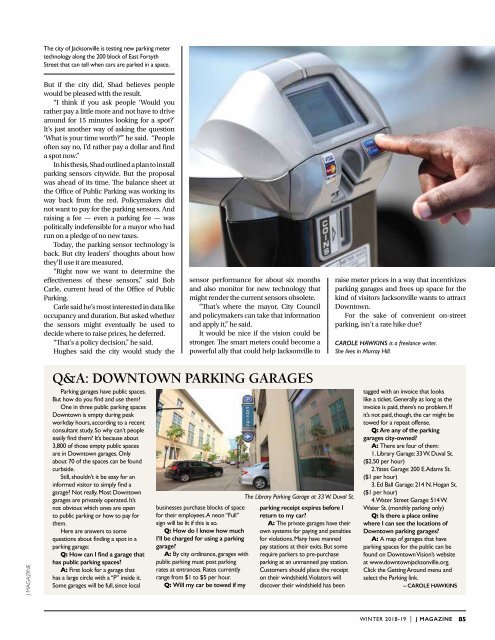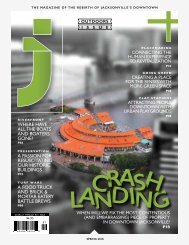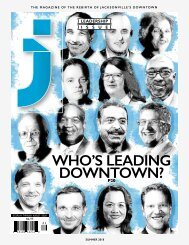J Magazine Winter 2018
You also want an ePaper? Increase the reach of your titles
YUMPU automatically turns print PDFs into web optimized ePapers that Google loves.
The city of Jacksonville is testing new parking meter<br />
technology along the 200 block of East Forsyth<br />
Street that can tell when cars are parked in a space.<br />
But if the city did, Shad believes people<br />
would be pleased with the result.<br />
“I think if you ask people ‘Would you<br />
rather pay a little more and not have to drive<br />
around for 15 minutes looking for a spot?’<br />
It’s just another way of asking the question<br />
‘What is your time worth?’” he said. “People<br />
often say no, I’d rather pay a dollar and find<br />
a spot now.”<br />
In his thesis, Shad outlined a plan to install<br />
parking sensors citywide. But the proposal<br />
was ahead of its time. The balance sheet at<br />
the Office of Public Parking was working its<br />
way back from the red. Policymakers did<br />
not want to pay for the parking sensors. And<br />
raising a fee — even a parking fee — was<br />
politically indefensible for a mayor who had<br />
run on a pledge of no new taxes.<br />
Today, the parking sensor technology is<br />
back. But city leaders’ thoughts about how<br />
they’ll use it are measured.<br />
“Right now we want to determine the<br />
effectiveness of these sensors,” said Bob<br />
Carle, current head of the Office of Public<br />
Parking.<br />
Carle said he’s most interested in data like<br />
occupancy and duration. But asked whether<br />
the sensors might eventually be used to<br />
decide where to raise prices, he deferred.<br />
“That’s a policy decision,” he said.<br />
Hughes said the city would study the<br />
sensor performance for about six months<br />
and also monitor for new technology that<br />
might render the current sensors obsolete.<br />
“That’s where the mayor, City Council<br />
and policymakers can take that information<br />
and apply it,” he said.<br />
It would be nice if the vision could be<br />
stronger. The smart meters could become a<br />
powerful ally that could help Jacksonville to<br />
raise meter prices in a way that incentivizes<br />
parking garages and frees up space for the<br />
kind of visitors Jacksonville wants to attract<br />
Downtown.<br />
For the sake of convenient on-street<br />
parking, isn’t a rate hike due?<br />
Carole Hawkins is a freelance writer.<br />
She lives in Murray Hill.<br />
J MAGAZINE<br />
Q&A: DOWNTOWN PARKING GARAGES<br />
Parking garages have public spaces.<br />
But how do you find and use them?<br />
One in three public parking spaces<br />
Downtown is empty during peak<br />
workday hours, according to a recent<br />
consultant study. So why can’t people<br />
easily find them? It’s because about<br />
3,800 of those empty public spaces<br />
are in Downtown garages. Only<br />
about 70 of the spaces can be found<br />
curbside.<br />
Still, shouldn’t it be easy for an<br />
informed visitor to simply find a<br />
garage? Not really. Most Downtown<br />
garages are privately operated. It’s<br />
not obvious which ones are open<br />
to public parking or how to pay for<br />
them.<br />
Here are answers to some<br />
questions about finding a spot in a<br />
parking garage:<br />
Q: How can I find a garage that<br />
has public parking spaces?<br />
A: First look for a garage that<br />
has a large circle with a “P” inside it.<br />
Some garages will be full, since local<br />
businesses purchase blocks of space<br />
for their employees. A neon “Full”<br />
sign will be lit if this is so.<br />
Q: How do I know how much<br />
I’ll be charged for using a parking<br />
garage?<br />
A: By city ordinance, garages with<br />
public parking must post parking<br />
rates at entrances. Rates currently<br />
range from $1 to $5 per hour.<br />
Q: Will my car be towed if my<br />
The Library Parking Garage at 33 W. Duval St.<br />
parking receipt expires before I<br />
return to my car?<br />
A: The private garages have their<br />
own systems for paying and penalties<br />
for violations. Many have manned<br />
pay stations at their exits. But some<br />
require parkers to pre-purchase<br />
parking at an unmanned pay station.<br />
Customers should place the receipt<br />
on their windshield. Violators will<br />
discover their windshield has been<br />
tagged with an invoice that looks<br />
like a ticket. Generally as long as the<br />
invoice is paid, there’s no problem. If<br />
it’s not paid, though, the car might be<br />
towed for a repeat offense.<br />
Q: Are any of the parking<br />
garages city-owned?<br />
A: There are four of them:<br />
1. Library Garage: 33 W. Duval St.<br />
($2.50 per hour)<br />
2. Yates Garage: 200 E. Adams St.<br />
($1 per hour)<br />
3. Ed Ball Garage: 214 N. Hogan St.<br />
($1 per hour)<br />
4. Water Street Garage: 514 W.<br />
Water St. (monthly parking only)<br />
Q: Is there a place online<br />
where I can see the locations of<br />
Downtown parking garages?<br />
A: A map of garages that have<br />
parking spaces for the public can be<br />
found on Downtown Vision’s website<br />
at www.downtownjacksonville.org.<br />
Click the Getting Around menu and<br />
select the Parking link.<br />
– CAROLE HAWKINS<br />
WINTER <strong>2018</strong>-19 | J MAGAZINE 85
















